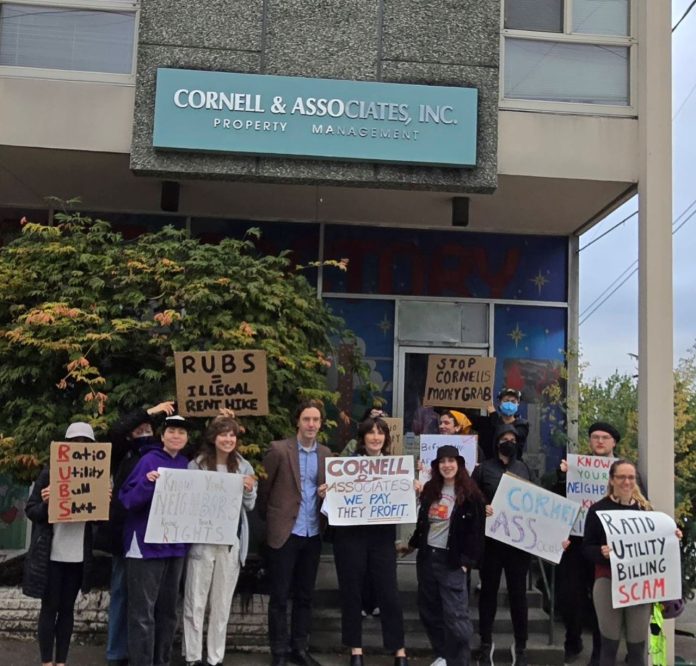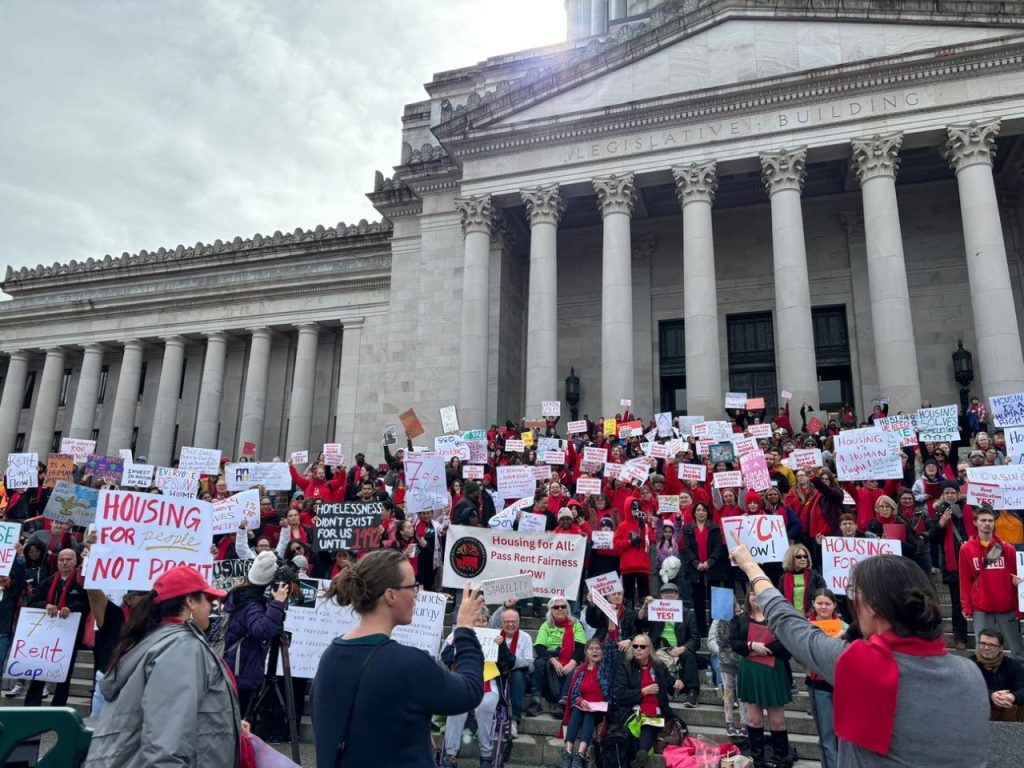
Landlords have used ratio utility billing systems as a backdoor to jack up rents. It’s time to ban the practice.
On April 1, tenants at Qualman Apartments on Capitol Hill were shocked when their utility bills were 5-8 times higher than the previous baseline. Tenants went from paying a $50 flat fee covering non-electric utilities to anywhere between $265 to $429 a month for the same services.
Six months earlier, tenants received a notice from their property management company, Cornell & Associates, that their building was switching from flat rate utility billing to a ratio utility billing system (RUBS). Tenants were not told this would increase their monthly housing expenses by nearly 25%.
Landlords implementing RUBS often describe it as based on tenant utility usage, but this is often inaccurate. RUBS is frequently used in multi-family buildings where units are not individually sub-metered, so landlords create a formula of estimated usage based on factors like the number of tenants per unit, the units’ square footage, and the number of bedrooms in a unit. Landlords use their formula to split a building’s master utility bill across each unit. The formulas aren’t always accurate in practice.
After talking to their neighbors at Qualman, tenants discovered that people in the same-sized units with the same number of occupants were charged different amounts, and some people on one-year leases still paid the $50 flat rate.
Cornell & Associates would not provide their calculations for how common areas, such as hallways and the laundry room, vacant units, and the units on one-year leases were deducted from the master bill. This makes determining how Cornell & Associates actually calculates utility bills quite difficult.
The utility price hike is not the only problem tenants faced when their buildings switched to RUBS. Qualman tenants have no control over their heat usage because the building uses a central boiler connected to radiators in units and common areas. After talking to each other, they learned that they shared the experience of their units overheating in the winter. Tenants who complained about the problem to the building manager were told to “open a window.”
Winter heat bills accounted for approximately 50% of the building’s annual utility costs. This means that under RUBS, Qualman tenants are paying more money for wasted utilities and there is less incentive for Cornell & Associates to improve the building’s energy efficiency systems.
This RUBS experience is not isolated to Qualman. Tenants at the Porter, another Cornell & Associates building, also received a lease addendum explaining that, under RUBS, their building’s utility bills would be split evenly among units based on the number of tenants in each apartment, with common utilities like hallway lights and washing machines removed from the calculation. However, the final utility rates charged to each unit appeared to be arbitrarily calculated to hit a maximum, unspecified cap for each unit. The Porter, like Qualman, is heated by a central boiler, and many tenants cannot control their radiators.
How RUBS figures into Washington State’s recently passed rent stabilization legislation is unclear. The new law limits annual rent increases for existing tenants to 7% plus inflation or 10%, whichever is lower. While the law is fuzzy when it comes to how utility billing interacts with this legislation, it is clear that RUBS financially burdens renters in a way that the state legislature was trying to curtail.

As a result of egregious RUBS bills, one Qualman tenant had to move out after living in the building for nine years. Two more tenants moved out after they received their second RUBS bill.
RUBS’ negative impact on tenants is deeply and widely felt in other parts of the country, and multiple jurisdictions outside of Washington have already taken action against the practice. In California, San Jose and West Hollywood have both banned the system outright. In 2024, Connecticut’s Supreme Court ruled that RUBS “mak[es] the tenant liable to the landlord for the costs of utilities that were not individually metered or that the tenant did not exclusively use” and ultimately banned RUBS throughout the state (Northland Inv. Corp. v. Pub. Utils. Regul. Auth. (SC 201769)).
North Carolina banned RUBS as well, though only for water utilities. Santa Monica, Californa does not ban RUBS per se, but does have laws limiting utilities charges so that utilities plus rent cannot exceed predetermined limits.
The City of Seattle needs to join these jurisdictions in banning RUBS, an unfair and predatory utility billing practice. Unfortunately, the immediate prospects for such a ban appear bleak in light of City Council’s reactionary turn over the last few years.
That said, tenants are not powerless in the face of this abusive system.
In May 2025 tenants in Los Angeles’ Koreatown organized against RUBS when their property management company used similar tactics as Cornell & Associates. One month later, these LA tenants launched an ongoing “RUBS strike.”
On June 20, tenants at the Qualman, with support from the Puget Sound Tenants Union (PSTU), delivered a letter to Cornell & Associates demanding an end to RUBS. Since the delivery of the Qualman demand letter, Qualman tenants received a response with promising concessions.
On Wednesday, July 9, tenants from other Cornell & Associates buildings came together to deliver a petition with over 100 signatures across 42 buildings demanding an end to RUBS.
Want to join the fight against unfair utility hikes at Cornell & Associates and across Seattle? Sign the petition demanding an end to RUBS!


